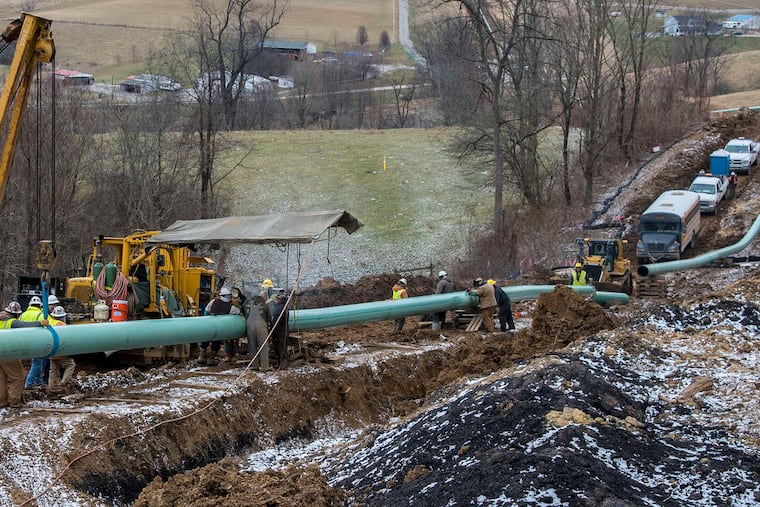U.S. Supreme Court ponders the fate of a fracked natural gas pipeline to New Jersey
PennEast applied to the federal government six years ago to build a 116-mile pipeline from northeastern Pennsylvania to carry fracked natural gas to a location near Trenton.

More than 230 years after the Founding Fathers adopted the Constitution, the nation’s judiciary is still trying to figure out what “sovereign immunity” means, at least as it applies to a pipeline that delivers fracked Pennsylvania natural gas to New Jersey.
The U.S. Supreme Court on Wednesday heard oral arguments from the PennEast Pipeline Co. LLC, which complains that New Jersey illegally blocked it from acquiring key easements on land in which the state has an interest, thwarting the federally approved $1.2 billion pipeline.
New Jersey says the U.S. Constitution’s sovereign immunity clause exempts it from being sued by a private entity such as PennEast. “This is, at its core, a private lawsuit against a state in federal court — exactly as the framers guarded against,” Jeremy M. Feigenbaum, New Jersey’s solicitor, said in a brief.
But PennEast, which is operated by a subsidiary of UGI Corp. of Valley Forge, says it is acting essentially as a deputy of the federal government, which granted the pipeline company eminent domain power over states when the Federal Energy Regulatory Commission approved the pipeline project. It says a 2019 decision by a federal appeals court that sided with New Jersey was “deeply flawed.”
The justices pressed PennEast’s lawyer, Paul D. Clement, to defend his arguments that PennEast was acting as an agent of the government. Justice Sonia Sotomayor said the delegation of federal eminent domain authority to a private entity “is troublesome to me.”
The case raises important jurisdictional issues of states rights versus federal law, and attracted the attention of anti-pipeline activists as well as the gas industry and business advocates. Edwin Kneedler, acting U.S. solicitor general, argued that the U.S. Constitution permits Congress to delegate its eminent domain authority to private entities.
PennEast applied to the federal government six years ago to build a 116-mile pipeline from northeastern Pennsylvania to carry fracked natural gas to a location near Trenton. The pipeline venture is owned by five energy companies, including its operator, UGI Energy Services.
The pipeline ran into roadblocks in New Jersey under Gov. Phil Murphy, whose administration turned sour on the fossil-fuel project and challenged PennEast’s claims to easements on 42 properties in which the state has an interest. The properties include two that New Jersey owns and 40 on which the state granted conservation easements requiring the land be preserved for recreational, conservation, or agricultural use.
PennEast prevailed in district court, but the Third Circuit Court of Appeals sided with New Jersey’s argument that a sovereign immunity protects it from lawsuits by private parties, even when entities such as PennEast have obtained federal eminent domain authority.
PennEast argues that its authority is derived from the Natural Gas Act, an 82-year-old law that gives the federal government authority to designate certain energy infrastructure to be in the public interest and authorizes the use of eminent domain to acquire rights of way. Congress passed the law specifically to avoid allowing state and local officials to veto interstate projects found to be in the public benefit.
The pipeline company says the lower court decision is an obvious threat to pipeline development. “It provides a road map for converting state lands — including the beds of rivers forming state boundaries — into barriers to pipeline development,” wrote Clement, a former U.S. solicitor general who is a partner in the Kirkland & Ellis law firm.
New Jersey said the pipeline company overstates the importance of the lower court decision, which it says only precludes private parties from filing condemnation suits against states. A federal agency could obtain the rights of way on behalf of a pipeline, it argues.
Even if the Supreme Court rules in PennEast’s favor and refines the outlines of sovereign immunity, the legal challenge has achieved some measure of success — several years of delay to the project, during which there has been a political shift against fossil-fuel infrastructure amid growing concerns about climate impact.